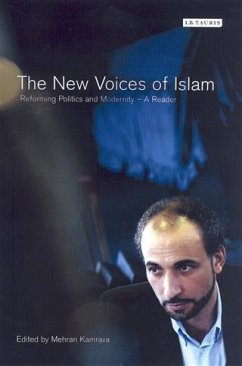Dieser Download kann aus rechtlichen Gründen nur mit Rechnungsadresse in A, B, BG, CY, CZ, D, DK, EW, E, FIN, F, GR, HR, H, IRL, I, LT, L, LR, M, NL, PL, P, R, S, SLO, SK ausgeliefert werden.
Over the last decade, at a time when the forces of 'Islamic fundamentalism' appear to be the dominant face of Islam in the West, a vibrant and equally consequential discourse has emerged from a number of prominent Muslim thinkers who wish to reform and reformulate some of the main premises of Islamic theology and jurisprudence. The central goal of these 'New Islamists' - who are based throughout the Islamic world, from Indonesia and Malaysia in Southeast Asia to Algeria and Morocco in north Africa - is to reinterpret popular notions of Islam that are consistent with and supportive of the tenets of modern life. Their corpus of work touches on three broad themes: Islamic hermeneutics; Islam's relationship with modernity; and the relationship of Islam with democracy and civil rights. The thinkers whose work is reproduced in this book represent some of the most notable Muslim intellectuals of our time, and include Tariq Ramadan (Switerland), Abdul Rahman Abbad (Palestine), Fethullah Gulen (Turkey), Chandra Muzzafar (Tunisia), Yusuf al Qaradawy (Qatar), Nasr Abu Zaid (Egypt) and Mohammed Arkoun (Algeria). Despite their importance in their own countries, seldom before have their voices been heard by western audiences. Yet both on their own, and collectively, the arguments that these thinkers advance point to very significant changes in the direction and evolution of Islamic doctrine as a whole. This timely volume, which places the life, career and arguments of each thinker in their proper national and historical contexts, at last gives the reformist tradition within Islam the attention it deserves.

